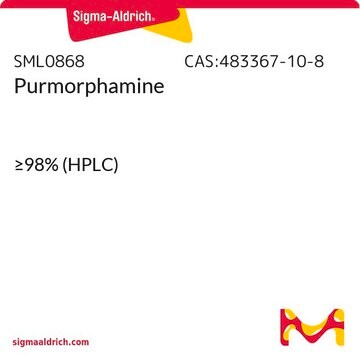14530
bisBenzimide H 33258
for fluorescence, ≥98.0% (HPLC)
Synonym(s):
2′-(4-Hydroxyphenyl)-5-(4-methyl-1-piperazinyl)-2,5′-bi(1H-benzimidazole) trihydrochloride, 2-[2-(4-Hydroxyphenyl)-6-benzimidazoyl]-6-(1-methyl-4-piperazyl)benzimidazole trihydrochloride, BBIH, BXI-72, HOE 33258, Hoechst 33258, NSC334072
About This Item
Recommended Products
grade
for fluorescence
Quality Level
Assay
≥98.0% (HPLC)
form
powder
solubility
water and ethanol: 10 mg/mL
H2O: soluble
ethanol: soluble
fluorescence
λex 338 nm; λem 505 nm (pH 7.0)
λex 355 nm; λem 465 nm in TE buffer; DNA
storage temp.
2-8°C
SMILES string
Cl[H].Cl[H].Cl[H].[H]O[H].CN1CCN(CC1)c2ccc3NC(=NCc3c2)c4ccc5NC(=NCc5c4)c6ccc(O)cc6
InChI
1S/C27H28N6O.3ClH.H2O/c1-32-10-12-33(13-11-32)22-5-9-25-21(15-22)17-29-27(31-25)19-4-8-24-20(14-19)16-28-26(30-24)18-2-6-23(34)7-3-18;;;;/h2-9,14-15,34H,10-13,16-17H2,1H3,(H,28,30)(H,29,31);3*1H;1H2
InChI key
OWRSPPSBNWJJAR-UHFFFAOYSA-N
Looking for similar products? Visit Product Comparison Guide
Application
Springer, Volume 218 ).
Excitation max. = 346 nm
Emission max. = 460 nm
Biochem/physiol Actions
Other Notes
Storage Class Code
11 - Combustible Solids
WGK
WGK 3
Flash Point(F)
Not applicable
Flash Point(C)
Not applicable
Personal Protective Equipment
Certificates of Analysis (COA)
Search for Certificates of Analysis (COA) by entering the products Lot/Batch Number. Lot and Batch Numbers can be found on a product’s label following the words ‘Lot’ or ‘Batch’.
Already Own This Product?
Find documentation for the products that you have recently purchased in the Document Library.
Customers Also Viewed
Our team of scientists has experience in all areas of research including Life Science, Material Science, Chemical Synthesis, Chromatography, Analytical and many others.
Contact Technical Service









